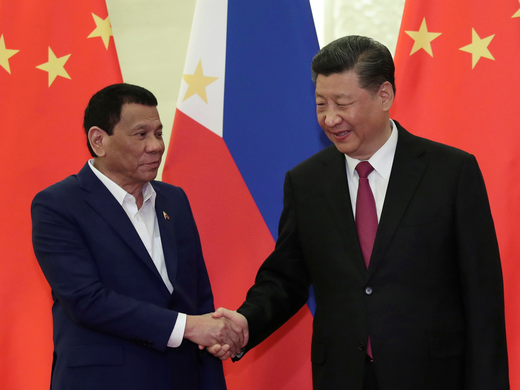Would the #MeToo movement have grown as it has without digital activism? It began with a hashtag that went viral. Women around the world found spaces online to speak freely about sexual harassment and abuse and find support. For all its flaws, social media provides spaces for freedom of expression, mobilization and connection. Because institutions had failed to listen and respond to victims, women turned to social media and blogs.
While much attention has been paid to the impact of #MeToo in North America and Europe, the case of tennis player Peng Shuai, who accused a high-level member of the Chinese Communist Party (CCP) of sexual abuse on social media and then mysteriously disappeared (and then reappeared), has drawn attention to sexual misconduct in China. As Beijing cracks down on online and offline activism, what does this mean for the country’s growing feminist movement? How does the situation in China compare to those in countries such as Japan and South Korea which, though they have very different political systems, have commonalities when it comes to the economic and political status of women?
Responses to #MeToo have varied around the world. Although successes have been smaller in East Asia than in North America, the movement has had a considerable impact in Japan, South Korea and China. These are countries where gender inequalities remain profound, despite general affluence and high GDP. Relatively few women have access to leadership positions, patriarchy is widespread, and avenues for women who want to complain about sexual harassment are scarce or non-existent. Across Asia, the #MeToo movement has become embedded in long-simmering feminist movements.
Online, engagement with #MeToo has taken on characteristics specific to the political, socio-economic, cultural and digital milieux of the respective countries. In Japan, the movement was rather slow to grow and few women went public, according to a 2019 study by Linda Hasunuma and Ki-young Shin, which offers several cultural and socio-economic reasons to explain this.
First, the economic gender gap remains particularly stark, for a country with the third-highest GDP in the world. In an examination of the social attitudes in South Korea and Japan toward sexual violence, Daisy Liu at the University of Toronto writes that in the Japanese workplace, the culture of endurance and normalization of sexual harassment is widespread, including at the highest level of the political class. In 2018, following accusations against his vice finance minister, Minister of Finance Taro Aso said that “sexual harassment isn’t a crime. It’s not the same as charges of murder or sexual assault.” It should therefore come as no surprise that in Japan, as Liu reports, fewer than five percent of women report rape and that, when they do, the burden of proof falls on the victim.
As in other countries, Japan’s #MeToo movement began online when several women used Facebook and Twitter to go public about having been sexually abused. But what is particularly striking in Japan is the backlash these revelations prompted. Many victims were pressured to remain silent, their integrity was questioned, victim blaming was widespread, and some faced professional consequences. Journalist Shioti Ito, who is considered one of the leaders of the #MeToo movement in Japan, received death threats and was forced to leave the country for her own safety. Online bullying and trolling led many Japanese women to remain silent or to post anonymously. To avoid scrutiny and criticism, they also used the hashtag #WithYou to redirect attention away from individuals and toward collective support. In Japan, therefore, online spaces provided some avenues to speak out and find support collectively in a country where many are apparently not yet ready for a major change in gender relations.
In South Korea, where feminist movements had already undergone several waves, the #MeToo movement has had a more widespread impact, including on law and policy. Sexual harassment in South Korea is a major problem, with 80 percent of men in one study admitting they had physically or psychologically abused a girlfriend. Following public accusations made by junior prosecutor Seo Ji-hyun against a senior male colleague, women began speaking out on social media and found support through the #WithYou hashtag. Social media platforms were used to organize offline protests and to demand policy changes. As in Japan, victims experienced an online backlash that included victim blaming and bullying, and some faced professional repercussions. Others covered their faces at rallies in order to avoid recognition or, worse, acid attacks.
China’s feminist movement has grown gradually over the past decade as activists tapped into discontent among Chinese women.
China’s experience with the #MeToo movement and feminist activism more generally is particularly indicative of the country’s political changes over the past few years. Cultural and socio-economic challenges aside, China’s single-party authoritarian system makes it unique. An open internet provides the fundamental freedoms and digital rights — freedom of expression, freedom from internet censorship, and freedom to associate and connect — that allowed the #MeToo movement to grow and have an impact. The capacity to speak out and to share experiences with other women is what made and continues to make the #MeToo movement significant. How can a feminist movement evolve in a country in which these fundamental rights are constantly under siege and where access to online civic spaces is shrinking?
China’s feminist movement has grown gradually over the past decade as activists tapped into discontent among Chinese women. While China is an economic powerhouse, most Chinese women have missed out on this economic growth and their average income has fallen dramatically. Young, university-educated women, in particular, have begun to challenge growing gender inequalities and discrimination as well as patriarchy’s traditional notions of gender and marriage. In 2009, Lu Pin started Feminist Voice, a media agency that became a major channel for feminist advocacy, until it was banned by Chinese authorities in 2018. In universities and schools around China, young women have engaged in activism, debates and performance art to condemn sexual harassment in universities, which, according to a study by the Korean Institute of Criminology, is extremely widespread.
In 2014, when Zhou Xiaoxuan, better known as Xianzi, reported to the police that she had been sexually abused by famous TV anchor Zhu Jun, she was dismissed and told that Zhu was a national example of “positive energy.” Xianzi dropped her complaints until the advent of the #MeToo movement in 2017, when she wrote a 3,000-word essay on the Weibo platform and sued the TV anchor. Her accusations went viral: women approached her with their own stories, her account gained more than 300,000 followers, and women formed online communities on WeChat. Although Xianzi’s story is one of very few cases that managed to evade state censorship, it seemed to break the taboo of speaking out about sexual violence.
One of the most prominent cases is that of the “Feminist Five,” a group of five young women who were arrested on March 6, 2015, hours before International Women’s Day on March 8 and the twentieth anniversary of Beijing’s hosting of the UN World Conference on Women. Their ostensible misdeed was to plan to distribute stickers with messages opposing sexual harassment. They were charged with “picking quarrels and provoking trouble” and detained for 37 days. Social activisim in China, including digital activism, is regarded as a challenge to power of the governing CCP. Li Maizi, a member of the Feminist Five, told me in a recent interview that young Chinese women began campaigning on university campuses and social media due to the lack of legal consequences for perpetrators of abuse, in particular, those who were CCP members, who have long been untouchable. As in other countries, when institutions failed, social media became an avenue for those seeking justice.
The 2015 crackdown was a clear sign that the Chinese state viewed feminism as a threat. Needless to say, the crackdown backfired. News of the arrests sparked offline and online mobilization through the hashtag #FreeTheFive. As in Japan and South Korea, Li told me, the movement is much more collective and cross-generational than the #MeToo movement in North America.
Over the past few years, the CCP has grown increasingly authoritarian, cracking down on all activism, especially online. The sophisticated propaganda and censorship deployed by the government against feminist digital activism illustrates this digital authoritarian turn. State censors use advanced techniques such as topic and keyword bans that immediately trigger removals of posts. The expression #MeToo has long been banned in China. When women used the emojis for “Rice” and “Bunny” (“Rice bunny” [米兔], pronounced as “mi tu”) as well as the hashtag #RiceBunny to circumvent censorship, these too became part of a long list of banned keywords. Activists are constantly forced to find creative ways to get their messages out, including by using protest art, images, videos and even songs.
Social media companies in China regularly take down prominent activist accounts. Indeed, more important than the message is the messenger. The central government is concerned with non-party influencers who might spread messages that could undermine the legitimacy of the party. Consequently, when censors take down accounts, activists create new ones or ask other women to relay their messages.
Moreover, the state has gone beyond these takedowns. Increasingly, it is resorting to more aggressive forms of online censorship and state-sponsored harassment by collaborating with misogynistic ultra-nationalist users who bully and attack women online, accusing them of being anti-China, “sluts,” “race traitors” and foreign agents. The aim is to damage their reputations and force them offline. This activity has become a lucrative business for social media platforms and users alike, because attacks against women draw clicks and therefore ad revenues. State censors benefit from this grassroots community of nationalistic users, encouraging their posts to amplify the misogynous propagandistic message and fan nationalistic sentiment, while barring social media access to people they perceive as threats to law and order.
The aim of these tactics is to completely isolate feminist activists from one another, weaken their ability to organize and destroy online communities. Considering how much the #MeToo movement relies on a community of support, the government’s attempt to sever relationships is, sadly, efficient. It goes beyond traditional censorship by attacking the social nature of social media itself and does considerable damage as women are cut off from their support network.
Is there hope for the future of the feminist movement and digital activism in China? The answer depends on who you ask. Li Maizi believes that Peng Shuai’s case and the Chinese government’s large-scale social media propaganda on Western social media may serve as a new impetus and that the notoriety of the case may help women in China break through another high ceiling. Author and activist Leta Hong Fincher said in a recent Twitter Spaces organized by The New York Times that the movement persists in China, including in invisible ways, and that Peng Shuai’s case has energized the movement as the Feminist Five did in 2015.
Xianzi, whose social media accounts have now been banned in China, laments that she has been cut off from her community of support. She also recently lost her legal battle against Zhu Jun and feels as if she is the one who committed a crime.
In an interview with The Guardian’s “Full Story,” Lu Pin, the former editor of Feminist Voice, who has found refuge in the United States, said feminism alone cannot change the country. However, she told Dissent magazine that she hopes that China’s feminist movement can rely on Chinese women in the diaspora to serve as a support base and relay their messages. “If we don’t set up this group in the U.S., China’s feminist movement will become too passive. The position of our core activists is extremely fragile,” she says.
Yet, the legacy of the fights led by prominent women such as Xianzi, the Feminist Five, Lu Pin and now Peng Shuai cannot be understated. Women worldwide have been changed by the movement and seem ready to speak out. In this regard, China is no different.



